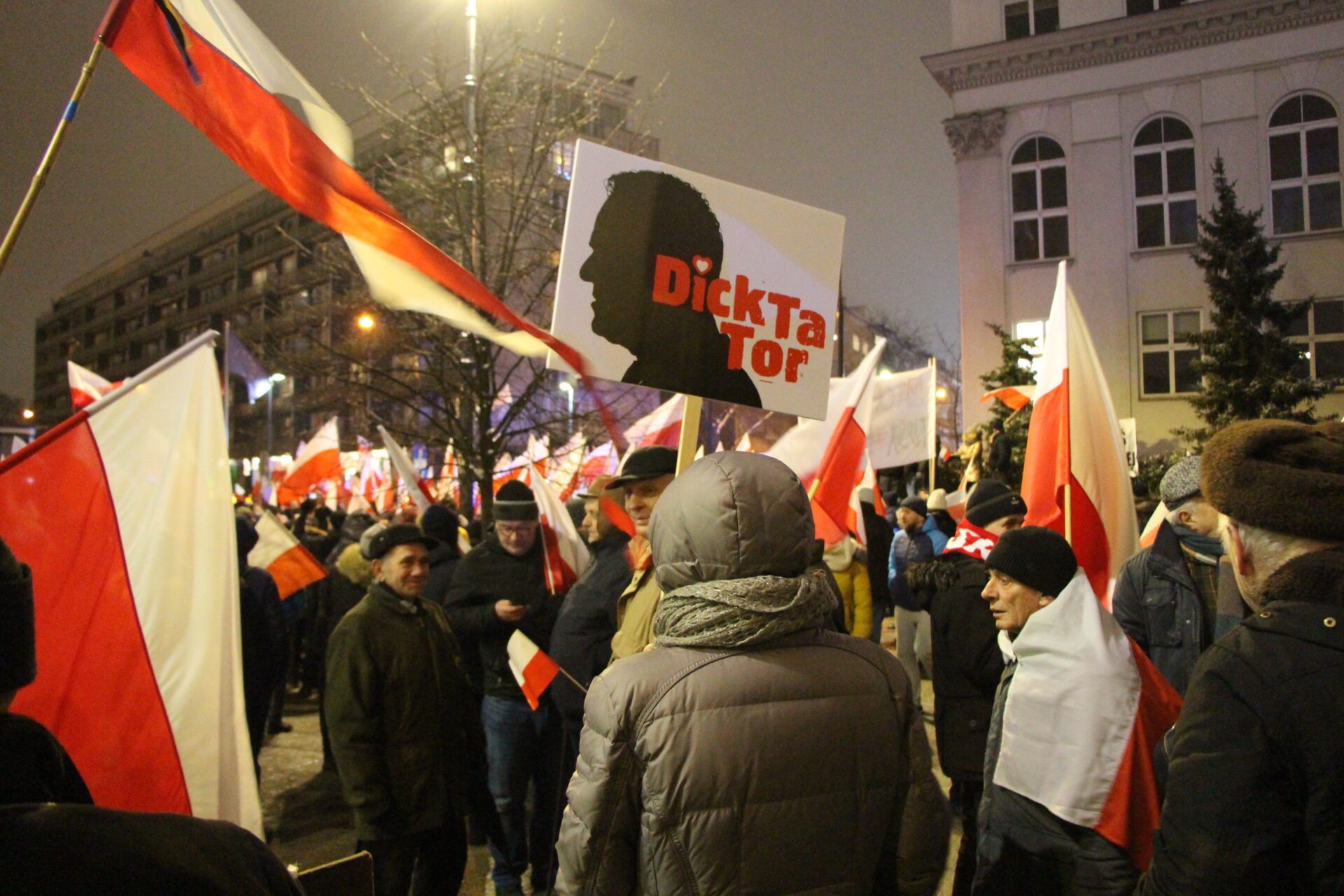Poland – “Democratic” pro-EU liberal left governing with resolutions and batons

Things are moving much faster in Tusk’s second stint in power. The line he previously chose not to cross fell by the wayside just a few months into his second term. This cannot be explained by natural dynamics, as events do not occur in a vacuum; it is the prime minister and the leader of the dominant coalition faction who seeks constantly to escalate tensions, evidently pressuring subordinates and coalition partners to act faster, more violently and more provocatively.
Rafał A. Ziemkiewicz
Such an action seems to contradict political logic, which would dictate that he should maintain relative calm until the European elections, or even next year’s presidential elections, and take radical action only after consolidating his power. The Sejm’s recent resolution, the meaning of which is to negate the constitutional functions of the Constitutional Tribunal, and the appeal to offices and courts to ignore its rulings – both current ones and those issued in the past eight years – is a clear crossing of the Rubicon of legal chaos and an open rejection of the constitutional order of the Republic of Poland. One could enumerate at length the attendant horrors of this scheme. The first, and most basic, one is the very deployment of such a maneuver by those in power.
CHAOS AND ESCALATION
According to the Constitution, the sources of law in Poland are (in this order): the Constitution, laws, ratified international agreements and regulations. Sejm resolutions, whether adopted by a simple or qualified majority, have no legal effect and cannot simply emerge. Neither opinions of „experts” nor any encouragement and expression of support from the leaders of foreign countries and international organizations to which Poland belongs can change this. The Sejm, which has felt empowered to adjudicate through resolutions on the status of the Constitutional Tribunal and its judges, may at its next session just as well pass, for example, the seizure by coalition party boards of citizens’ private savings deposited in bank accounts.
Thus, anything can now be passed – the question is what can be enforced. When the Russian parliament was outlawed by Lenin in a similar way to Tusk by a resolution of the Council of Workers’ and Soldiers’ Delegates, evoking the „will of the people,” the resolution became law, because Lenin had at his disposal numerous armed thugs who, on the Council’s orders, simply physically dispersed the constituent assembly. For the time being, it does not appear that Tusk has created similar opportunities for himself. (…)
How to enforce obedience on 9,000 judges, the vast majority of whom react to the „restoration of the rule of law” by the current authorities with reserve and passive resistance? In the case of some courts, it is even open resistance. (This is, of course, contrary to the assurances of the leaders of the left-wing Iustitia judges’ association and other party apparatchiks with links to Tusk’s Civic Platform.) This would require the creation of an efficient terror apparatus and effective repression.
What Tusk is undoubtedly achieving, on the other hand, is chaos and escalation of tension. And that seems to be the point. To invoke a classic revolutionary maxim, „The goal is nothing, the movement is everything.” The parties of the left-liberal coalition and their celebrity–media supporters have, in just a few years, moved to radically different positions from those they articulated in the early days of Law and Justice (PiS) rule. They have gone from parading around in t-shirts with the word „Constitution” and a sclerotic approach to legal provisions, „which are not debated,” to a complete rejection of these concepts in favor of the „spirit of the law,” „presumption” and „the need to avoid legal formalism.” Above all, they intend to disabuse voters of any expectations.
Poland allowed to violate rule of law if ruled by pro-EU liberals
Once they idolized the president of the Constitutional Tribunal and appealed to judges to rule against the existing law, „directly on the basis of the Constitution.” Now they completely disown these principles, essentially on the grounds that anyone who has entered office in the last eight years is a representative of an „anti-democratic regime” and must be removed as such. Members of the European Parliament and the European Commission, headed by its president, have “legitimized” this behavior.
It can be said without exaggeration that all the things that Law and Justice’s leader Jarosław Kaczyński allegedly did, which aroused fury and hatred in Tusk’s camp, now provoke enthusiasm and adoration when done by Tusk himself in favor of his camp.
Tusk’s camp aroused fury and hatred with its insinuations about Kaczyński. It is not an exaggeration to state that all the behaviors once ascribed to “our side” provoke enthusiasm and adoration in that same camp. Contrary to left-liberal media legends, Kaczyński has never had such a well–trained and influential group of followers. At the pinnacle of Law and Justice’s success, surveys showed that less than half of those declaring support for the party were willing to subscribe to its radical message (e.g., on the issue of the „Smolensk assassination”).
However, a devout congregation of celebrity-media „authorities” and the urban professional–managerial class holds sway over many hearts and minds, but it is a small minority. Despite all the mistakes of the Law and Justice party and the huge media onslaught in favor of the „broad democratic coalition,” Tusk has failed to break through the glass ceiling of 30–percent support. He is in power today solely due to the electoral performance of the center-right Third Way, for which spin doctors mobilized those who might be called impressionable „swing voters.” For the most part, these are the same people who only a few months earlier declared they would vote for the Confederation coalition of nationalists and libertarians. They might be ready to support the latter again in a few months or become the base of some new political force.
(…)
OVERPOWER THE COALITION PARTNERS
The main factor influencing the prime minister’s behavior is precisely the need to share power with the Third Way, one of whose leaders makes no secret of his presidential ambitions. Those ambitions are at odds with the plans of the Civic Platform (PO) and Tusk himself. Again, one might doubt whether it is possible to introduce a dictatorship effectively by way of resolutions and whether the apparatus of state violence is sufficiently under control to do so. However, the amplification of chaos and the strengthening of mutual hatred between PO’s urban base and PiS supporters effectively overpowers Tusk’s coalition partners and subjects them to his authority.
Donald Tusk’s left-liberal authoritarian revolution: Poles are facing something completely new
Is it coincidental timing for the appalling resolution declaring the „non-existence” of the Constitutional Tribunal and its president, Julia Przyłębska? Anti-PiS coalition figures announced and discussed such plans for several months, almost immediately after the elections. Is it a coincidence that this finally materialized just now, after two spectacular clashes within the coalition, on the day of the big protest of farmers and trade unionists? And was there, coincidentally, a show of force from the police that day, and possibly a deliberate provocation designed to facilitate it?
Both intra-coalition quarrels were the result of the Third Way’s attempt to emancipate itself from PO’s increasingly pronounced imperiousness. First, its leaders insisted that the prime minister fulfill a joint election promise and restore the way health premiums are charged to small entrepreneurs (formally, the so-called self–employed). While they didn’t threaten concrete reprisals if Tusk reneged, they dared to make rather menacing faces while issuing their demands. It’s a potentially popular demand that Tusk couldn’t fulfill, even if he wanted to, as his government has already attempted to implement part of the teacher raises promised during the campaign. The budget is strained, and it’s already drawing about 10 (and according to some, even 20) billion złotys from the robbery of entrepreneurs initiated by Law and Justice’s Polish Deal.
The second renegade move, this time by Hołownia himself, was the announcement to postpone the legislative procedure for the full legalization of abortion. Admittedly, it was accompanied by a quiet promise, unnoticed by most voters, to amend the anti-abortion law with the „assertion of a threat to the mental health of the mother.” In practice, this would mean abortion on demand. (It would suffice for a pregnant woman to declare that her condition is hampering her well–being.) But, after all, the abortion dispute is not about abortion itself, but about gaining a „scalp,” the only one the Left, already completely devoid of its traditional identity, can pursue. Hołownia’s move is understandable from his point of view, as he must demonstrate that he is closer to the center than the extremes if he wants to think seriously about the presidential elections. This has therefore provoked outrage from the Left, which, in turn, works more in favor of the PO than the Left itself. It ultimately shows the leftist electorate that, even on this issue, the last one remaining on the leftist agenda, the causal force is not the Left, but Tusk’s party.
Donald Tusk’s government will not find it easy to liberalize abortion in Poland
No one familiar with police conduct has any doubt that violent scenes occur when the police want them to, and not because of the spontaneous behavior of demonstrators. (…) The day after the brutal confrontations, Tusk, hitherto in the habit of being simultaneously for and against farmers, switched to a tone of firm defense of the Green Deal against the enemies “of our existence in Europe.” Given this, one can conclude that Tusk has deliberately chosen the farmers to be „black sheep,” like the football fans previously, and party propaganda will soon disparage them repeatedly. This makes the PSL coalition partner’s situation untenable. It is rather doubtful that it will dare to abandon its numerous posts in the nearly 140-member government and its subordinate institutions, so it will have to ameliorate the situation and beg the prime minister to soften his tone.
NO TURNING BACK
Tusk is utilizing the short–term benefits of tarnishing Polish public life, escalating social tensions, and amplifying chaos, as this is momentarily so beneficial to him and his EU patrons. The question is, does he calculate the long-term consequences of his behavior? Does he think he can manage with foreign aid, or does he believe he will escape responsibility in time? An old saying, confirmed by the fate of virtually all past dictatorships, holds that you can prop yourself up with a bayonet, but you can’t sit on it for long. This wisdom applies also to governing with resolutions and batons – something from which, after what he has done in the past weeks, Donald Tusk can no longer turn back.
This article was first published in Polish in the Do Rzeczy weekly in March 2024.



